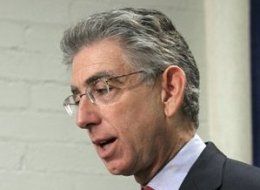Financial Crisis Investigators Looking At Wall Street
Investigators for the commission created to examine the causes of the financial crisis have begun their probe of Goldman Sachs and other Wall Street banks, focusing on their role in the biggest financial crisis since the Great Depression.
"It's a matter of great interest for us," said Phil Angelides, chairman of the Financial Crisis Inquiry Commission.
Goldman Sachs and others helped inflate the housing bubble by funding and securitizing junk mortgages, selling them off to investors and pocketing the fees -- while at the same time placing contrary bets in the expectation that the market would eventually crash. It did.
While some Wall Street firms suffered heavy losses, others booked a profit. Goldman Sachs was one of the latter. And it's the firm's actions during those critical years that has it in the cross hairs of federal investigators.
"It's a matter we're interested in pursuing and I have every expectation we will," Angelides told the Huffington Post in an interview this week.
Goldman's chief executive, Lloyd Blankfein, testified before the commission last month. He and Angelides had a particularly testy exchange regarding Goldman's contrary bets. The firm has maintained it was hedging -- that is, protecting itself from excessive bets by placing contrary ones to help balance them out. It's standard fare for Wall Street. Angelides said that's part of the problem.
"Much of what happened may not have only been permitted but was applauded in this society," Angelides said. The commission has requested information and documents from Goldman and others. It also sent follow-up questions to Goldman, Angelides said.
But the inquiry into specific practices is just one part of the panel's comprehensive look at the causes of the financial crisis. Over the next two days, the commission will be holding a conference in Washington, D.C. where noted academics will be explaining the various big-picture practices and developments that led to the crisis. Topics include too-big-to-fail, reckless speculation on derivatives, the lack of effective regulation, and the explosion in subprime lending.
"This weekend is about looking at the big picture," Angelides said. But, he noted, the commission is also undertaking "specific inquiries of specific institutions and individuals and regulators." And the panel is prepared to compel witnesses to talk using its subpoena power.
"If they drag their feet, we'll move forward and issue subpoenas," Angelides said of his investigators' targets. "It's not good enough for someone to smile at us and nod their head and then produce nothing. They got to produce."
Asked if there's been any pushback thus far, Angelides said: "Early on some of the public agencies [regulators] talked to us a little bit about confidential information, but the statute is very clear -- we're entitled to it." In January, during the panel's first hearings, the commission's vice chairman, former Republican congressman Bill Thomas, asked two of the chief federal financial regulators, Sheila Bair of the Federal Deposit Insurance Corporation and Mary Schapiro of the Securities and Exchange Commission, whether those issues were resolved. Bair and Schapiro replied that they were.
"We've made many requests of corporations and public agencies, and as of today the entities are in compliance," Angelides said. "Both indicating a willingness to comply and in producing documents." The commission's final report is due in December. Information needs to flow now. "We're very conscious of our tight time frame," Angelides said, which is why the panel doesn't shy away from issuing subpoenas.
Angelides said the commission will hold a significant number of hearings throughout the spring and summer. The next round will be based on "hearings and investigations that have begun to date," Angelides said.
Get HuffPost Business On Twitter, Facebook, and Google Buzz! Know something we don't? E-mail us at huffpostbiz@gmail.com



























First Posted: 02-26-10 12:00 PM | Updated: 02-26-10 05:58 PM